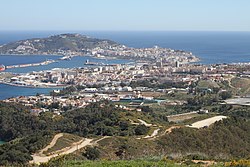Ceuta
Ceuta
سَبْتَة (Arabic) | |
|---|---|
Autonomous city | |
 | |
| Motto(s): "Siempre Noble, Leal y Fidelísima Ciudad de Ceuta"[1] "Always Noble, Loyal and Highly Loyal City of Ceuta" | |
| Anthem: "Ceuta, mi ciudad querida" "Ceuta, my beloved city" | |
 Location of Ceuta within Spain | |
| Coordinates: 35°53′18″N 5°18′56″W / 35.88833°N 5.31556°WCoordinates: 35°53′18″N 5°18′56″W / 35.88833°N 5.31556°W | |
| Country | |
| Autonomous city | Ceuta |
| First settled | 1st millennium BC |
| End of Muslim rule | 14 August 1415 |
| Ceded to Spain | 1 January 1668 |
| Autonomy status | 14 March 1995 |
| Founded by | Carthaginians |
| Government | |
| • Type | Autonomous city |
| • Body | Council of Government |
| • Mayor-President | Juan Jesús Vivas (PP) |
| Area | |
| • Total | 18.5 km2 (7.1 sq mi) |
| • Land | 18.5 km2 (7.1 sq mi) |
| Elevation | 10 m (30 ft) |
| Highest elevation | 349 m (1,145 ft) |
| Population (2018)[2] | |
| • Total | 85,144 |
| • Density | 4,600/km2 (12,000/sq mi) |
| Demonyms | Ceutan ceutí (es) |
| Time zone | UTC+1 (CET) |
| • Summer (DST) | UTC+2 (CEST) |
| ISO 3166 code | ES-CE |
| Postal code | 51001–51005 |
| Official language | Spanish |
| Parliament | Assembly of Ceuta |
| Congress | 1 deputy (out of 350) |
| Senate | 2 senators (out of 264) |
| Website | www.ceuta.es |
Ceuta (UK: /ˈsjuːtə/, US: /ˈseɪuːtə/,[3][4] Spanish: [ˈθewta]; Berber languages: Sebta; Arabic: سَبْتَة, romanized: Sabtah) is a Spanish autonomous city on the north coast of Africa.
Bordered by Morocco, it lies along the boundary between the Mediterranean Sea and the Atlantic Ocean. It is one of nine populated Spanish territories in Africa and, along with Melilla, one of two populated Spanish territories on mainland Africa. It was part of the province of Cádiz until 14 March 1995. On that date, Statutes of Autonomy were passed for both Ceuta and Melilla.
Ceuta, like Melilla and the Canary Islands, was classified as a free port before Spain joined the European Union.[5] Its population consists of Christians, Muslims, and small minorities of Sephardic Jews and ethnic Sindhis from modern-day Pakistan.
Spanish is the only official language. Darija Arabic is also spoken by 15–20% of the population.[citation needed]
Names[]
The name Abyla has been said to have been a Punic name ("Lofty Mountain"[6] or "Mountain of God") for Jebel Musa,[7] the southern Pillar of Hercules.[8] The name of the mountain was in fact Habenna (Punic:


